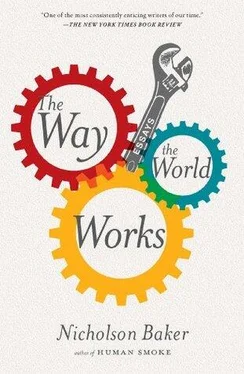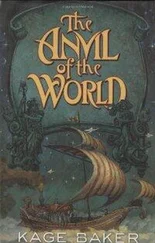All the camera angles in the world couldn’t help you here.
And yet Tolstoy wasn’t content merely to offer indirect thoughts. He was one of our very best introspectors, alert to uncatalogably fine gradations of moral compromise and motivic ambiguity, and sometimes he wanted us to overhear mental states rather than to read secondary paraphrases of them. So he has his characters think, “We shall see,” or “Oh dear!” or “Where was I?” or “Can it really be true?” Sometimes their inner voices are quite chatty:
‘If this is the case,’ he said to himself, ‘I ought to think it over and make up my mind, and not let myself be carried away like a boy by the impulse of the moment.’
Sometimes they are jealously chatty:
‘I cannot be made unhappy because a despicable woman has committed a crime. I merely have to find the best way out of the painful situation in which she has placed me. And find it I shall,’ he said to himself, his face growing darker and darker.
Did Tolstoy believe that his characters really said this sort of thing to themselves? I can’t believe that he believed it, any more than Shakespeare believed that people make life-or-death decisions in blank verse, with one hand on their chest and the other held out sideways. I believe that if I were able to tap Tolstoy on the shoulder and ask him why he had written these particular lines this way, he would say to me, “Well, I was trying to record what my characters would have told me if I had been able to tap them on the shoulder and ask them at that instant what words were in them.”
Actually, though, Tolstoy would probably say to me, “I have no patience for questions of this kind. Leave me now to walk barefoot among the birches.”
In any event, Tolstoy is, fortunately, not the only writer to understand that the reader’s bond of sympathy and intimacy with a character must be reinforced, goosed slightly, every so often, by a directly quoted brain-whisper. The character must say things that only we, and nobody else in the book, can hear. It doesn’t have to happen much.
Some children’s writers do it well, and there’s pedagogy in this, perhaps: quoting thoughts is an efficient way of teaching how to match spoken language with invisible states of mind — it’s like holding up an apple you can’t see and saying “apple.” Masters of the ghost story, too, rely on the technique to create a quick shudder, as in this from M. R. James:
‘What should I do now,’ he thought, ‘if I looked back and caught sight of a black figure sharply defined against the yellow sky, and saw that it had horns and wings?’
Note the punctuation in these passages: they have quotation marks. These writers evidently felt that, as with real speech, psychic speech needs visible delimiters to set it off from its surroundings. (In the original Russian, Tolstoy used little  French-style brackets,
French-style brackets,  but the effect of enclosure is the same.) I have spent some hours recently foraging around in paperbacks, and I can report that practically all the big-name writers through 1930 or so — people, I mean, like Henry James, Edith Wharton, Virginia Woolf, E. M. Forster, Willa Cather, Theodore Dreiser, Joseph Conrad, Sherwood Anderson, and Sinclair Lewis — felt the need to put their characters’ thoughts within quotes from time to time. (Sinclair Lewis: “She said to herself, ‘As though I cared whether I’m seen with this fat phonograph!’” Willa Cather: “She remembered him and said to herself: ‘I don’t think I ever heard a nicer voice than that boy had.’”)
but the effect of enclosure is the same.) I have spent some hours recently foraging around in paperbacks, and I can report that practically all the big-name writers through 1930 or so — people, I mean, like Henry James, Edith Wharton, Virginia Woolf, E. M. Forster, Willa Cather, Theodore Dreiser, Joseph Conrad, Sherwood Anderson, and Sinclair Lewis — felt the need to put their characters’ thoughts within quotes from time to time. (Sinclair Lewis: “She said to herself, ‘As though I cared whether I’m seen with this fat phonograph!’” Willa Cather: “She remembered him and said to herself: ‘I don’t think I ever heard a nicer voice than that boy had.’”)
Now writers don’t do this. I asked a copy-editor friend how the literary world was punctuating its thoughts these days, and he polled some copy-editor friends of his. One wrote back: “I haven’t seen quotation marks on thoughts in at least five years.”
Why did they die out? Joyce and Faulkner — they’re at the root of it. Ulysses has great blobs of transcribed thought, but the quotation marks themselves are lacking:
Mr Bloom moved forward raising his troubled eyes. Think no more about that. After one. Timeball on the ballast office is down. Dunsink time. Fascinating little book that is of sir Robert Ball’s Parallax. I never exactly understood. There’s a priest. Could ask him. Par it’s Greek: parallel, parallax.
Not only are the quotation marks gone, but there is no obliging tag such as “he reflected” or “he said to himself” inserted after the first interior sentence to help us keep track of where we are. “Oh, good,” said Joyce’s readers to themselves, brushing Hi Ho cracker crumbs from their laps, “now all the artificial barriers can come down, and interior and exterior reality can ooze together into one sense-perceptual fondue.”
But, again, did Mr. Bloom actually, literally think, “There’s a priest,” followed by, “Could ask him”? I can’t imagine that he did. Mr. Bloom’s eye lighted on a figure in clerical dress — a visual, not verbal, mind-event — and the possibility of asking the figure a question briefly arose and was dismissed within him. Joyce’s way looked new, but he was doing what the traditional novelists did: hanging out raw, wet harvestings of visual and emotive protoplasm to dry on grammatical clotheslines, the only difference being that there is in Ulysses a great deal more dried protoplasm. Bloom’s thought-residues are (once you get into the swing of the book) sometimes startling and beautiful, but they aren’t any less artificial than when, say, M. R. James has a character mentally scope out, within quotes, his evening plans. In fact, they’re more artificial. Here’s how M. R. James did it:
‘I might walk home tonight along the beach,’ he reflected—‘yes, and take a look — there will be light enough for that — at the ruins of which Disney was talking.’
Joyce would twist off the knobs of the quotation marks and render the passage something like this:
The beach way. Might walk home tonight. Disney said the ruins? Templars’ preceptory. Knights in Jerusalem, looters, really. Cries of the maidens. Having their way. Light enough for that.
And then, while the literary classes were still chewing over this development, Faulkner began an aggressive program of italicizing. Here’s a snip from Light in August:
That was two years ago, two years behind them now, thinking Perhaps that is where outrage lies. Perhaps I believe that I have been tricked, fooled .
What was a modernist to do? There was simply no way to reconcile Joyce’s austere depunctuation with the booming self-importance of Faulkner’s typography. Both were excitingly modern, and yet they pointed in opposite directions. Thought transcription was thrown into a state of uncertainty from which it has not yet recovered. Some went naked—
I too have done my share of social climbing, he thought, with hauteur to spare, defying the Wasps. (Bellow, Herzog )
To the gallows I go, she said to herself, and had another large drink. (Drabble, The Realms of Gold )
— while the post-Faulknerians, such as Tom Clancy, reached for italics, which are punchier:
Julio stood and shouldered his weapon. There was a slight but annoying tinkle from the metal parts as he did so — the ammo belt, Ding thought. Have to keep that in mind . ( Clear and Present Danger )
Sometimes, though, those urgent forward diagonals turned out to have a little too much punch, forcing the reader to interpret a shy, fleeting brain-state as if it were roared out in a hoarse whisper:
He fumbled his latchkey into its slot, thinking: Now she’ll ask me why I lock my door and I’ll mumble and stumble around, looking for an answer, and seem like a fool .
Читать дальше

 French-style brackets,
French-style brackets,  but the effect of enclosure is the same.) I have spent some hours recently foraging around in paperbacks, and I can report that practically all the big-name writers through 1930 or so — people, I mean, like Henry James, Edith Wharton, Virginia Woolf, E. M. Forster, Willa Cather, Theodore Dreiser, Joseph Conrad, Sherwood Anderson, and Sinclair Lewis — felt the need to put their characters’ thoughts within quotes from time to time. (Sinclair Lewis: “She said to herself, ‘As though I cared whether I’m seen with this fat phonograph!’” Willa Cather: “She remembered him and said to herself: ‘I don’t think I ever heard a nicer voice than that boy had.’”)
but the effect of enclosure is the same.) I have spent some hours recently foraging around in paperbacks, and I can report that practically all the big-name writers through 1930 or so — people, I mean, like Henry James, Edith Wharton, Virginia Woolf, E. M. Forster, Willa Cather, Theodore Dreiser, Joseph Conrad, Sherwood Anderson, and Sinclair Lewis — felt the need to put their characters’ thoughts within quotes from time to time. (Sinclair Lewis: “She said to herself, ‘As though I cared whether I’m seen with this fat phonograph!’” Willa Cather: “She remembered him and said to herself: ‘I don’t think I ever heard a nicer voice than that boy had.’”)










